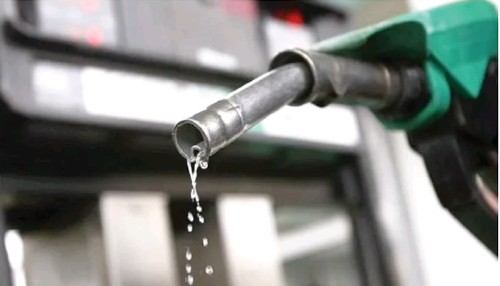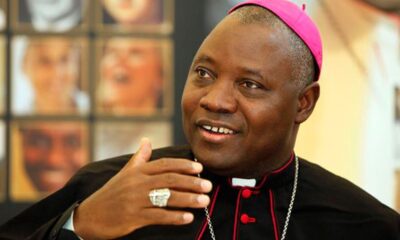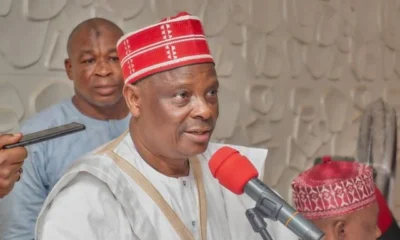Mohammed Idris, the Minister of Information and National Orientation, on Wednesday, said the importation of Premium Motor Spirit, popularly called petrol, into Nigeria has reduced by 50 percent since the withdrawal of subsidy on the commodity.
Recall that President Tinubu, during his inaugural speech on May 29, 2023, declared that fuel subsidy was gone. Within 24 hours after that declaration, the Nigerian National Petroleum Company Limited, Nigeria’s sole importer of PMS, withdrew subsidy on petrol.
This led to a jump in the price of the commodity from about N198/litre to over N500/litre, as it later moved up to over N600/litre and currently sells for between N620/litre and N700/litre depending on the area of purchase.
Speaking at the third edition of the ministerial press briefing series in Abuja on Wednesday, where the Coordinating Minister for Health and Social Welfare addressed journalists, Idris stated that subsidy removal had led to the reduction of fuel imports by 50 percent.
“Petrol importation has been reduced by 50 per cent since the withdrawal of the fuel subsidy,” the information minister stated.
On February 18, 2023, about three months before PMS subsidy was removed by Tinubu, the Group Chief Executive Officer, NNPCL, Mele Kyari, revealed that Nigeria was consuming about 66 million litres of PMS daily.
Kyari also stated that over N400bn was spent monthly to subsidise PMS at the time, stressing that the subsidy was having adverse impacts on the cash flow of NNPCL.
NNPCL is the sole importer of petrol into Nigeria and has continued to play this role for several years running, bearing the huge cost of fuel subsidy.
Other private oil marketers stopped importing petrol into Nigeria due to the difficulty encountered in accessing the dollars required for the imports of PMS.
Kyari had said, “Today, by law and the provisions of the Appropriation Act, there is a subsidy on the supply of petroleum products, particularly PMS imports into our country. In current data terms, three days ago, the landing cost was around N315/litre.
“Our customers are here; we are transferring to each of them at N113/litre. That means there is a difference of close to N202 for every litre of PMS we import into this country. In computation, N202 multiplied by 66.5 million litres, multiplied by 30 will give you over N400bn of subsidy every month.”
Going by the latest position of the information minister that petrol importation has dropped by 50 per cent, it implies that the volume of imports into Nigeria has reduced by about 33 million litres daily, based on NNPCL’s figures in February.
This means that PMS importation has dropped by about 990 million litres in one month.
Oil marketers told one of our correspondents that the ex-depot price of petrol, that is the cost of the commodity from NNPCL, was around N585/litre.
A reduction of 33 million litres means the country is currently saving about N19.3bn daily and N579.1bn monthly as a result of the removal of subsidy on PMS by the President.
The revelation by the information minister might not be far from the truth because oil marketers have stated several times that the purchase of petrol has reduced drastically.
The National President, Natural Oil and Gas Suppliers Association of Nigeria, Bennet Korie, said, “The consumption of petrol has dropped to the lowest level ever. Filling stations are shutting down because there is no business anymore.
“The business is now very tough and marketers are struggling to survive. People don’t buy petrol again like before. So most filling stations are locking up because they cannot continue running at a loss.”
Korie also stated that the over 200 members of NOGASA could be forced to withdraw their services, because it was becoming increasingly difficult for oil marketers to fund their operations, a development that led to the shutdown of 70 per cent downstream oil sector businesses.
“Another issue is that of high bank interest rates. Today if you want to buy one truck of PMS, you will spend N30m. And if you go to a bank to get N30m at over 30 per cent interest rate, you know how much you will pay to the bank, all in the name of inflation.
“So if care is not taken, we will also withdraw our service because there is no way out. 70 per cent of oil traders are out of business, so it is better that the government looks into this issue before it gets out of hand. Many of them (operators) cannot talk but they come to us to complain,” he stated.
This came as the African Export-Import Bank, on Wednesday, disclosed that it had become the largest financier of oil and gas projects in Africa.
The bank disclosed investing $30bn in industry projects, with Nigeria receiving 60 per cent ($18bn) despite reduced global funding for hydrocarbon ventures in Africa
President, Afreximbank, Prof. Benedict Oramah, says Africa has to find innovative solutions to its huge energy deficit.
Oramah spoke at the National Oil Companies Forum at the ongoing Nigeria International Energy Summit in Abuja.
He was represented by the Executive Vice President, Global Trade Bank, Afriexim, Haytham ElMaayergi.,
Oramah lamented that it was incomprehensible that in a continent with abundant oil, gas, solar hydro resources, the bulk of the population still lacked access to reliable and affordable energy.
He explained the continent lacked extensive traditional energy infrastructure, but stressed that this had presented an opportunity for leapfrogging in a more efficient way to renewable technology.
“Our aspiration in the area of energy security and energy transition will remain aspiration unless we have access to adequate funding resources that we control. With a lot of international banks withdrawing funding out of the oil and gas sector, the investment in the industry has become severely limited with the corresponding impact on exploration and production.
“Afreximbank has intervened in a big way, quickly becoming the largest financier of oil and gas deals in the continent. The support provided to the sector by the bank is in excess of $30bn. Nigeria has been one of the largest beneficiaries accounting for almost 60 percent of the total funding of the sector.
“And it’s important to the point that afreximbank has been able to make those modest contributions in the oil and gas sector because the bank is predominantly African in ownership and control,” he stated.
Oramah disclosed that Afreximbank would be managing the proposed Africa Energy Bank to ensure its best chance of success.
“The strategic goal of the Africa Energy Bank is to play a leadership role in shaping the energy landscape in Africa through strategic partnership with proven African and international financial institutions and investors and also to provide sustainable financing in this area of the oil and gas sector.
“The Africa energy bank will need considerable support to get off the ground. We will need support from member states to achieve the level of capitalization that is adequate to support the energy sector,” he stated.
Also on Wednesday, NNPCL and the Organisation of the Oil Exporting Countries pledged to work together to achieve the Nigeria’s aspirations to attract investments and grow production.
The two organisations came to this accord when the Secretary-General of OPEC, Haitham al-Ghais, paid a courtesy visit to the Group Chief Executive Officer, NNPCL, Mele Kyari, at the NNPC Towers in Abuja.
Speaking at the event, al-Ghais stated that OPEC was completely aligned with NNPCL’s vision as captured in its payoff line: “Energy for Today, Energy for Tomorrow”.
This, he said, was because of the oil firm’s inclusive view of energy as opposed to the view being pushed in some quarters that some sources of energy were bad.
He disclosed that in spite of the pushback on oil and gas, the world would require about $14tn investments from now till 2035 to be able to meet global demand, and urged NNPCL to do everything to tap into that opportunity to raise its production.
“We will continue to ensure that the market is stable. The global market has to be stable in order for Nigeria to be able to attract investors. If there’s volatility, if there’s no stability in the market, it will only create havoc for everybody, whether it’s a producer or consumer country.
“So, we will continue to do that in OPEC. We count on Nigeria’s support,” the OPEC helmsman stated.
In his remarks, Kyari said NNPCL was working very hard to recover lost production and provide the right fiscal environment to attract investments.
He expressed appreciation to OPEC for its support to Nigeria, adding that NNPCL would continue to support the organisation in whatever way it could.
Meanwhile, at the briefing series by the information minister, which was initiated to provide a platform for public officials to reel out their achievements and apprise Nigerians of the challenges of governance, Idris said Nigeria had begun to reap the benefits of the reforms being spearheaded by President Tinubu.
He said that the Nigeria’s gross domestic product grew by 3.46 per cent in the fourth quarter of 2023, as against 2.54 per cent recorded in the third quarter of 2023.
He also said capital importation rose to 66 percent in the fourth quarter of 2023, reversing a 36 per cent decline in the third quarter.
“The Nigerian Stock Exchange All Share Index crossed the 100,000 mark – its highest ever, mainly due to the pragmatic reforms initiated by the President, which inspired investor confidence in the Nigerian economy.
“It is also encouraging to state that oil production has risen from 1.22 million barrels per day in the second quarter of 2023 to 1.55 million barrels per day in the fourth quarter of 2023.”
President Bola Tinubu announced the removal of petrol subsidy during his inaugural address on May 29, 2023, saying, “Subsidy is gone.”
Idris notes that President Tinubu has also given a directive for the design of a Social Security Unemployment Programme to cater for the unemployed graduates.
“This is in addition to setting up of a Social Consumer Credit Scheme to boost the purchasing power of Nigerians, as they make adjustments in view of the temporary economic hardship.
“As the government rejigs the National Social Investment Programme, the direct payments of N25,000 to 15 million households will resume immediately.
“The government is equally tackling insecurity headlong and more success stories are coming in on daily basis. Without any doubt, we are winning the war against insecurity,” he said.
Credit: The Punch


 BIG STORY3 days ago
BIG STORY3 days ago
 BIG STORY2 days ago
BIG STORY2 days ago
 BIG STORY3 days ago
BIG STORY3 days ago
 BIG STORY2 days ago
BIG STORY2 days ago
 BIG STORY4 days ago
BIG STORY4 days ago
 BIG STORY5 days ago
BIG STORY5 days ago
 BIG STORY3 days ago
BIG STORY3 days ago
 BIG STORY2 days ago
BIG STORY2 days ago





















